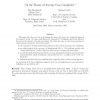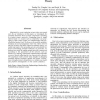3122 search results - page 62 / 625 » A Theory of Network Equivalence |
100
click to vote
FORTE
2010
14 years 11 months ago
2010
Wireless sensor networks are typically ad-hoc networks of resource-constrained nodes; in particular, the nodes are limited in power resources. It can be difficult and costly to rep...
HICSS
2006
IEEE
15 years 3 months ago
2006
IEEE
After more than a decade of research in information technology-enabled business process reengineering (BPR), no clear theory explains the link between information technology (IT) ...
STOC
1989
ACM
15 years 1 months ago
1989
ACM
This paper takes the next step in developing the theory of average case complexity initiated by Leonid A Levin. Previous works Levin 84, Gurevich 87, Venkatesan and Levin 88] have...
MDM
2009
Springer
15 years 4 months ago
2009
Springer
Mobile Ad-hoc NETworks (MANETs) are known to be vulnerable to a variety of attacks due to lack of central authority or fixed network infrastructure. Many security schemes have bee...
WOWMOM
2006
ACM
15 years 3 months ago
2006
ACM
Motivated by recent surfacing viruses that can spread over the air interfaces, in this paper, we investigate the potential disastrous threat of node compromise spreading in wirele...


